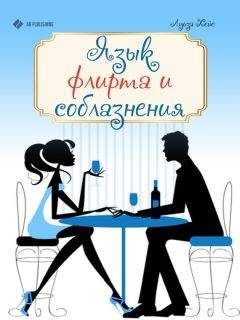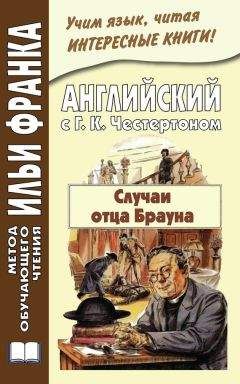Гилберт Честертон - Английский с Г. К. Честертоном. Рассказы об отце Брауне / Gilbert Keith Chesterton. The Innocence of Father Brown
“Look here (послушайте),” cried his friend impatiently (воскликнул его друг нетерпеливо), for the dark wood and the dark saying got a little on his nerves (так как темный лес и мрачные высказывания стали немного действовать ему на нервы; saying – пословица; поговорка; сказанное); will you tell me this story or not (вы расскажете мне эту историю или нет)? What other evidence is there to go on (какие еще есть свидетельства, чтобы продолжить; evidence – основание; знак, симптом; факты, данные; доказательство, подтверждение; свидетельство)?”
They were soon in the most secret entrails of the wood, and felt close about them foliage that they could not see, when the priest said again:
“Where does a wise man hide a leaf? In the forest. But what does he do if there is no forest?”
“Well, well,” cried Flambeau irritably, “what does he do?”
“He grows a forest to hide it in,” said the priest in an obscure voice. “A fearful sin.”
“Look here,” cried his friend impatiently, for the dark wood and the dark saying got a little on his nerves; will you tell me this story or not? What other evidence is there to go on?”
“There are three more bits of evidence (у меня есть еще три свидетельства),” said the other (сказал другой), “that I have dug up in holes and corners (которые я отыскал с трудом: «откопал в ямах и углах»; to dig; hole and corner – тайный, секретный, совершаемый украдкой, скрываемый от посторонних; подпольный); and I will give them in logical rather than chronological order (я расскажу о них скорее в логической, чем в хронологической последовательности). First of all, of course, our authority for the issue and event of the battle is in Olivier’s own dispatches (прежде всего, конечно, нашим авторитетным источником о ходе и результате сражения говорится в донесениях самого Оливье), which are lucid enough (которые /достаточно/ понятны; lucid – прозрачный, ясный; четкий; понятный). He was entrenched with two or three regiments on the heights that swept down to the Black River (он вместе с двумя-тремя полками окопался на высотах, которые тянулись вплоть до Черной реки; to entrench – окапывать, укреплять траншеями; to sweep), on the other side of which was lower and more marshy ground (противоположный берег которой был ниже и более заболочен; marshy – болотный; болотистый, топкий; marsh – болото, топь). Beyond this again was gently rising country, on which was the first English outpost (далее местность поднималась более отлого, и там располагался первый английский аванпост), supported by others which lay, however, considerably in its rear (поддерживаемый другими силами, которые, впрочем, располагались значительно дальше).
“There are three more bits of evidence,” said the other, “that I have dug up in holes and corners; and I will give them in logical rather than chronological order. First of all, of course, our authority for the issue and event of the battle is in Olivier’s own dispatches, which are lucid enough. He was entrenched with two or three regiments on the heights that swept down to the Black River, on the other side of which was lower and more marshy ground. Beyond this again was gently rising country, on which was the first English outpost, supported by others which lay, however, considerably in its rear.
The British forces as a whole were greatly superior in numbers (британские войска в целом во много раз превосходили по численности /бразильские/); but this particular regiment was just far enough from its base to make Olivier consider the project of crossing the river to cut it off (но именно этот передовой полк находился на достаточно большом расстоянии от базового расположения войск, и Оливье /начал/ обдумывать план переправы через реку, чтобы отрезать его; to consider – рассматривать; обсуждать; взвешивать, обдумывать; to cut off – отрубить, отсечь; отрезать; to cut – резать). By sunset, however, he had decided to retain his own position, which was a specially strong one (однако к заходу солнца он решил остаться на своей прежней позиции, которая была исключительно выгодной; to decide – решать, принимать решение, делать выбор; strong – сильный; имеющий силу, преимущество). At daybreak next morning he was thunderstruck to see that this stray handful of English, entirely unsupported from their rear, had flung themselves across the river (на рассвете следующего дня: «утра» он был ошеломлен, увидев, что отбившаяся, полностью лишенная поддержки с тыла горсточка англичан переправляется через реку; daybreak – рассвет; thunderstruck – ошеломленный; как громом пораженный; thunder – гром; to strike – ударять/ся/; to stray – заблудиться; сбиться с пути; блуждать; бродить; handful – пригоршня; горсть; горстка, небольшое количество; to fling – бросаться; ринуться), half by a bridge to the right, and the other half by a ford higher up, and were massed upon the marshy bank below him (половина /людей/ по мосту справа, половина – вброд выше /по реке/ и группируются они на болотистом берегу, чуть ниже того места, где находились его войска: «чуть ниже него»).
The British forces as a whole were greatly superior in numbers; but this particular regiment was just far enough from its base to make Olivier consider the project of crossing the river to cut it off. By sunset, however, he had decided to retain his own position, which was a specially strong one. At daybreak next morning he was thunderstruck to see that this stray handful of English, entirely unsupported from their rear, had flung themselves across the river, half by a bridge to the right, and the other half by a ford higher up, and were massed upon the marshy bank below him.
“That they should attempt an attack with such numbers against such a position was incredible enough (то, что они /англичане/ с такими силами решились предпринять атаку /против такого расположения противника/, было само по себе достаточно невероятным); but Olivier noticed something yet more extraordinary (но Оливье увидел нечто еще более необычное; to notice – замечать, обращать внимание). For instead of attempting to seize more solid ground, this mad regiment, having put the river in its rear by one wild charge, did nothing more (вместо того, чтобы попытаться выбраться на более твердую почву, этот сумасшедший полк, сумевший при безумной атаке оставить реку позади, больше не предпринял ничего; to seize – хватать; завладевать, захватывать; wild – дикий; необдуманный; безумный; charge – нагрузка; заряд; расходы; атака; штурм), but stuck there in the mire like flies in treacle (завязнув в болоте, как мухи в патоке; to stick – застрять; mire – трясина, болото; топь; fly – муха; treacle – патока). Needless to say, the Brazilians blew great gaps in them with artillery (не стоит и говорить, что бразильцы пробили своей артиллерией большие бреши в их рядах; to blow; gap – пролом, брешь), which they could only return with spirited but lessening rifle fire (англичане могли противопоставить: «они могли только вернуть» лишь оживленный, но слабеющий ружейный огонь). Yet they never broke (и все-таки они не дрогнули; to break – ломать/ся/); and Olivier’s curt account ends with a strong tribute of admiration for the mystic valour of these imbeciles (и лаконичный рапорт Оливье заканчивается горячим восхищением загадочным бесстрашием этих глупцов; to admire – восхищаться; tribute – дань, должное; imbecile – глупец; идиот).
“That they should attempt an attack with such numbers against such a position was incredible enough; but Olivier noticed something yet more extraordinary. For instead of attempting to seize more solid ground, this mad regiment, having put the river in its rear by one wild charge, did nothing more, but stuck there in the mire like flies in treacle. Needless to say, the Brazilians blew great gaps in them with artillery, which they could only return with spirited but lessening rifle fire. Yet they never broke; and Olivier’s curt account ends with a strong tribute of admiration for the mystic valour of these imbeciles.
‘Our line then advanced finally (затем в конце концов наша пехота выдвинулась вперед; line – линия; черта; очередь; оборонительный рубеж; пехотные части /в британской армии/),’ writes Olivier (пишет Оливье), ‘and drove them into the river (и загнала их в реку; to drive); we captured General St. Clare himself and several other officers (мы взяли в плен самого генерала Сент-Клэра и нескольких других офицеров; to capture – захватывать, брать силой; брать в плен). The colonel and the major had both fallen in the battle (полковник и майор – оба пали в этом бою). I cannot resist saying that few finer sights can have been seen in history than the last stand of this extraordinary regiment (не могу удержаться, чтобы не отметить, что история видела не много таких прекрасных зрелищ, как последний бой этого замечательного полка); wounded officers picking up the rifles of dead soldiers, and the general himself facing us on horseback bareheaded and with a broken sword (раненые офицеры подбирали ружья убитых солдат, сам генерал отважно сражался на коне, с непокрытой головой, шпага его была сломана; to wound – ранить; to pick up – поднимать, подбирать; to face – сталкиваться /с неприятностями/; смело смотреть в лицо /опасности/).’ On what happened to the general afterwards Olivier is as silent as Captain Keith (о том, что случилось с генералом позднее, Оливье умалчивает, как и капитан Кит).”
“Well,” grunted Flambeau (проворчал Фламбо), “get on to the next bit of evidence (переходите к следующему свидетельству).”
‘Our line then advanced finally,’ writes Olivier, ‘and drove them into the river; we captured General St. Clare himself and several other officers. The colonel and the major had both fallen in the battle. I cannot resist saying that few finer sights can have been seen in history than the last stand of this extraordinary regiment; wounded officers picking up the rifles of dead soldiers, and the general himself facing us on horseback bareheaded and with a broken sword.’ On what happened to the general afterwards Olivier is as silent as Captain Keith.”
“Well,” grunted Flambeau, “get on to the next bit of evidence.”
“The next evidence (/что касается/ следующего свидетельства),” said Father Brown, “took some time to find, but it will not take long to tell (/мне/ пришлось потратить время, чтобы найти его, но не потребуется много времени, чтобы о нем рассказать). I found at last in an almshouse down in the Lincolnshire Fens an old soldier (в одном из приютов Линкольншира Фенс мне наконец-то удалось найти старого солдата) who not only was wounded at the Black River, but had actually knelt beside the colonel of the regiment when he died (который не только был ранен у Черной реки, но и стоял на коленях перед умирающим полковником этого полка; to kneel – преклонять колени, стоять на коленях). This latter was a certain Colonel Clancy, a big bull of an Irishman (этим последним был некий полковник Кланси, здоровенный, как бык, ирландец; latter – последний /из двух названных/); and it would seem that he died almost as much of rage as of bullets (и представляется, что он умер не столько от ран, сколько от ярости: «умер в такой же степени от ярости, как и от пуль»). He, at any rate, was not responsible for that ridiculous raid (он, во всяком случае, не несет ответственности за ту позорную операцию; ridiculous – нелепый, смехотворный; позорный); it must have been imposed on him by the general (по всей вероятности, она была навязана ему генералом). His last edifying words, according to my informant, were these (его последние предсмертные слова: «нравоучительные слова», как передал мне этот солдат: «согласно моему информанту», были следующими): ‘And there goes the damned old donkey with the end of his sword knocked off (вон едет проклятый старый осел со шпагой с отломанным концом). I wish it was his head (жаль, что он не сломал свою голову).’ You will remark that everyone seems to have noticed this detail about the broken sword blade (обратите внимание, все замечают эту деталь о сломанном клинке шпаги), though most people regard it somewhat more reverently than did the late Colonel Clancy (хотя большинство людей относятся к ней более почтительно, чем покойный полковник Кланси; to regard – расценивать, рассматривать; считать; относиться; reverent – почтительный, уважительный; благоговейный). And now for the third fragment (а теперь третья часть).”




